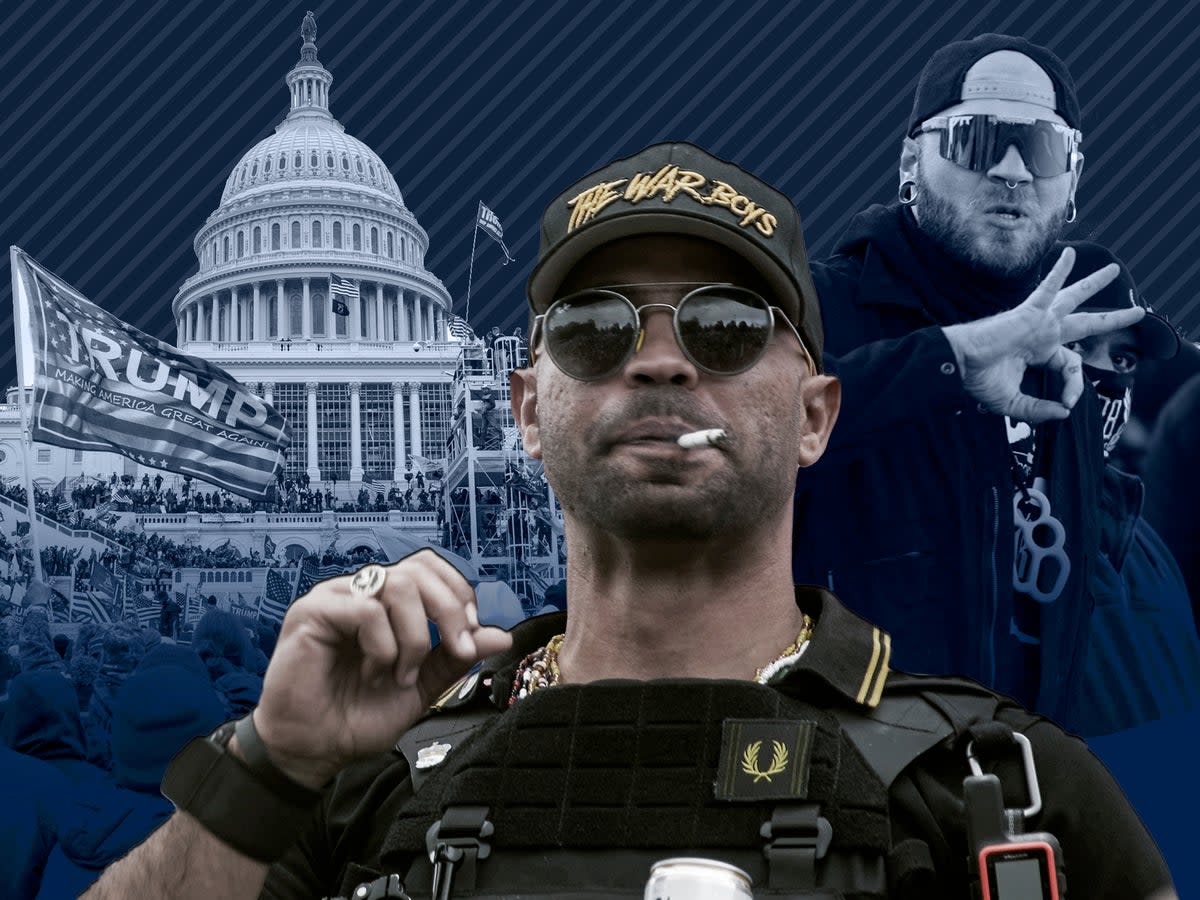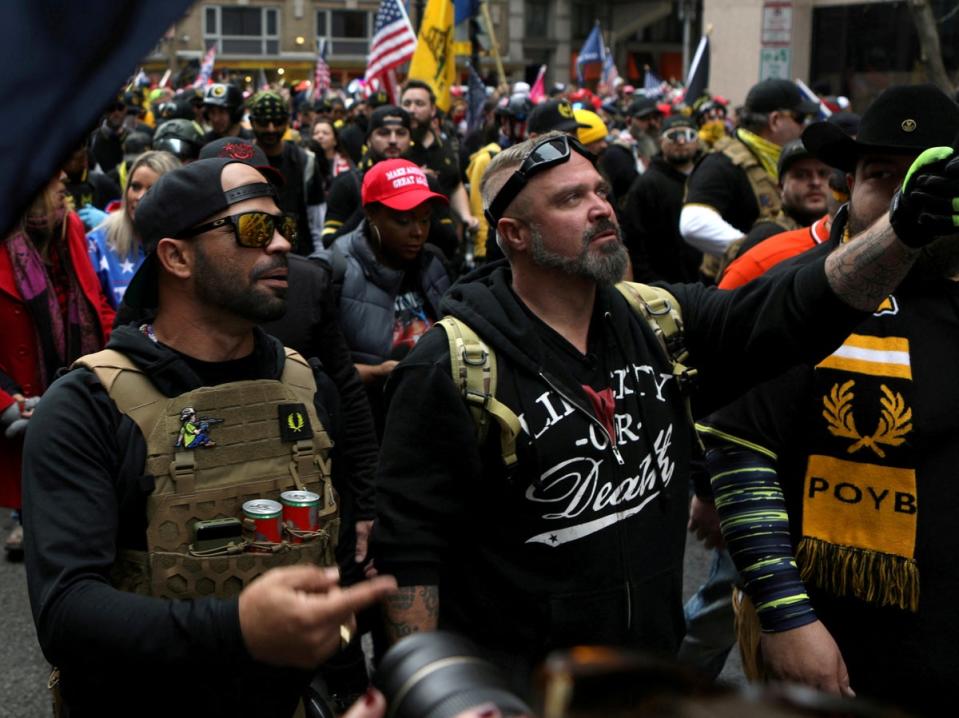Mic issues, Rudy Giuliani’s hair dye and blaming Trump: How opening day of the Proud Boys trial went down

- Oops!Something went wrong.Please try again later.
- Oops!Something went wrong.Please try again later.
- Oops!Something went wrong.Please try again later.
The attorneys defending five members of the Proud Boys against seditious conspiracy charges would have you believe that their actions were simultaneously “disgraceful” and afflicted by “myths” about their bigotry, that they were mere “scapegoats” misled by Donald Trump, and that they regret their actions – even though they stand by the belief that the Capitol riot was little more than a “six hour delay of Congress”.
Former Proud Boys chairman Enrique Tarrio, and four members Zachary Rehl, Ethan Nordean, Joe Biggs, and Dominic Pezzola are accused of conspiring to incite the January 6 Capitol riot in an effort to stop the peaceful transfer of power following the 2020 election.
On Thursday, they all returned to the scene of their alleged crimes as they were brought into the E. Barrett Prettyman Courthouse, just across the street from the US Capitol grounds, for the start of their trial.
The court day was plagued by sniping between the defence attorneys and Judge Timothy Kelly, human-caused technical issues that made one opening argument barely audible, and some polished defences for two of the most high-profile defendants on trial.
Mr Rehl’s attorney Carmen Hernandez spent a good portion of her opening argument holding her microphone over her head, ensuring that few people outside the courtroom — which included most of the press in an adjacent viewing room at the courthouse — could not hear what she was saying.
At one point she began citing the First Amendment, before moving the mic away from her mouth for an extended period of time.
By the time she brought it back so that her comments were audible, she had somehow worked her way to talking about former New York Mayor Rudy Giuliani and his infamous black hair dye incident.
It remains a mystery how this related to the case.
She also attempted to explain the origins of the term “red herring”, saying it involved fish and foxes, but gave up midway through when she apparently forgot how the story went.
Ms Hernandez also argued that the Proud Boys has been marred by “myths” that of being bigoted – trying to bat away this perception by telling jurors that one of Mr Rehl's friends who entered the Capitol with him was bisexual, and another was of Vietnamese heritage.
Among the bizarre statements and mic drama, what could be gleaned from her opening statements was essentially an argument that her client entered the Capitol out of simple curiosity and that his actions do not meet the legal requirement for conviction on a seditious conspiracy charge.
Meanwhile, Mr Pezzola's attorney Roger Root was audible the entire time he spoke – though his defence did include some equally questionable moments.

He played a video of his client smoking a cigarette in the Capitol near the end of the riot claiming victory, telling the jury that they would soon come to refer to it as the “not guilty video”.
“This is f***ing awesome. I knew we could take this motherf***er if we just tried hard enough. Proud of your motherf***ing boy,” Mr Pezzola says in the footage, a cigarette dangling from his mouth.
Mr Root played the video at least four times as he argued that it makes clear Mr Pezzola's intention was only to seize the Capitol building, and not to disrupt Congress.
He also claimed the case against the defendants was ultimately over a “six-hour delay of Congress”.
Mr Pezzola is accused of robbery and destroying property for taking a riot shield from a police officer and later using it to smash a window at the Capitol. Mr Root asked the jury if they thought “this looks like a robbery” as footage of both incidents was played in court.
The first clip shows his client tearing the shield away from an officer and leaving with it.
The second video shows another man using a 2x4 to create an initial break in a window of the Capitol, after which Mr Pezzola used the shield to clear out the rest of the glass. Mr Root argued that since the window had already been broken by another rioter, Mr Pezzola had really caused no additional damage to the property.
Mr Bigg's attorneys ultimately waived their opening arguments after some debate over his defence team — which includes conspiracy theorist Alex Jones' attorney Norm Pattis, who is facing suspension for sending sensitive information and two years worth of Mr Jones' text messages to the prosecution in that case, and attorney Dan Hull, who had some previous interactions with one of the government's key witnesses prior to the trial.
The attorneys for Mr Tarrio and Mr Nordean were significantly more polished, painting both men as victims of a Department of Justice attempt to mischaracterise their words and actions before the riot to portray them as conspirators.
Mr Nordean's attorney Nicholas Smith assured the jurors that he felt the riot was “a disgrace”. However, he urged them to exercise “detachment” of their personal feelings about the Proud Boys and the group's ideology when weighing the evidence in the case.
He cited the “butterfly effect” — the idea that minor actions can ultimately have far more serious consequences — as a more rational argument for the cause of the Capitol riot than a grand conspiracy engineered by the defendants, and said that the government's own witnesses would attest to the fact that no plan was in place by the Proud Boys prior to the riot.
“Don't take the bait,” he advised the jurors, accusing the government of misrepresenting the defendants' words and actions in an effort to portray them as conspirators.
Attorney Sabino Jauregui, representing Mr Tarrio, was the next to take the podium. The crux of his argument was that Mr Tarrio — who he characterised as the charismatic face of the Proud Boys — was a scapegoat for the government and instead blamed Mr Trump for “unleashing a mob” on the Capitol.

“It's too hard [for the goverment] to blame the FBI [for the riot], even though there were informants within the group. We can't blame the Secret Service, that's too difficult. We can't blame the leadership of the Metropolitan Police Department — not the guys on the ground, those guys are heroes who fought against the frenzied mob that Trump released on the Capitol — it was the fault of the leadership, but that's too difficult,” he said.
“Instead they go for the easy target — Enrique Tarrio, the leader of the Proud Boys.”
He said Mr Tarrio made it “easy” for the government to scapegoat him because he posted “offensive” messages online and used public marches of his members to attract new recruits and funding for the “drinking club” of “western chauvanists.”
Mr Jaurequi also emphasised that his client wasn't actually at the Capitol on the day of the riot — Mr Tarrio had been banned from the city by a judge after he was arrested for tearing a Black Lives Matter sign off a historically Black church and burning it one month prior — and played voice messages he said showed that Mr Tarrio was surprised that some members were planning to storm the building.
Ultimately he told jurors that the government wanted to include his client in the case as a way to bring down the Proud Boys organisation.
Assistant US Attorney for the Justice Department Jason McCullough also made his opening statement for the prosecution, laying out for jurors the government’s argument that Mr Tarrio and the other Proud Boys members planned and executed a plot to delay Congress in an effort to disrupt the transfer of presidential power.
Mr McCullough made clear early on that the Proud Boys as an organisation “were not on trial” and asked jurors to focus on the government's evidence that they conspired to attack the Capitol.
Mr McCullough cited numerous Telegram posts he said shows the defendants’ intent to incite “the normies” to attack the Capitol, as well as video from the day of the event and celebratory social media posts after the fact.
He also alluded to witnesses the prosecution plans to call during the trial that he said will attest to the existence of a plan prior to the riot.
“The evidence in this case proves their guilt. We see their coordinated actions, we'll see the celebration of the group's activities, and their attempt to cover their tracks,” he said during his opening statement.
“Once you've heard all the evidence, my colleague will stand before you and ask you to return the one verdict that is consistent with this evidence: that is [the defendants] are guilty of all charges.”
Less than a minute after Mr McCullough finished his statement, Ms Hernandez rushed to the mic and demanded a mistrial.
The judge rejected her request.

